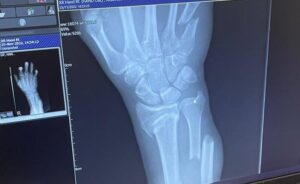Crown Censure issued following death of soldier
The Health and Safety Executive (HSE) has on, Thursday 3 October, issued the Ministry of Defence (MoD) with a Crown Censure following the death of a reservist soldier in Yorkshire.
Staff Sergeant John McKelvie of Drongan in Ayr, was killed after the Jackal vehicle he was driving rolled multiple times down a steep hill at Catterick Training Area on 29 January 2019.
At the time of the incident, the 51-year-old had been taking part in Jackal driver training with five other Army reservists. The off-road aspect of the training included a number of ascents and descents of steep inclines either side of a valley on land known as ‘The Land of Nod’. It was when attempting one of these ascents that the Jackal lost traction and rolled backwards, throwing one of the course leaders from the vehicle as it did so. Staff Sergeant McKelvie remained in the vehicle suffering serious injuries as it rolled. Despite being airlifted to hospital, he died six days later.

John’s sister Jacqueline Welsh (pictured below), provided a statement on behalf of the family, which said:
“John was a very outgoing person who loved spending time with his family.
“He was always there for you whenever you needed him.
“He loved his motorbike, and he loved sport and the outdoors. He was full of action!”

An investigation by the HSE identified that the training course involved hazardous activities, which gave rise to the potential for the vehicle to roll. This meant those taking part in the training were exposed to risk – however, that did not mean the activity itself should not have taken place. There were other steps that should have been taken to control the dangers with driving the vehicles, however these were not undertaken.
It also found a failure in oversight, meaning the course programme devised progressed too quickly and prevented trainees from developing the necessary expertise and skills before attempting more challenging obstacles on the off-road element of the course.
The risk assessments were not suitable and sufficient, and despite numerous previous ‘rollover events’, the Army failed to foresee what could go wrong.
The investigation also found that standing orders and directions had not been properly followed.
HSE inspector Mark Slater said: “All training, including that which is required to be as realistic as possible, should be planned, risk assessed and executed in such a manner that it does not endanger those who are involved.
“Had the systems implemented by the Army been more robust, Sergeant McKelvie would probably still be alive today.”
This HSE Crown Censure was brought by HSE enforcement lawyer Nathan Cook and supported by HSE paralegal officer Rebecca Forman.
Notes to Editors:
- The Health and safety Executive (HSE) is Britain’s national regulator for workplace health and safety. hse.gov.uk
- The MoD cannot face prosecution in the same way as non-Government bodies and a Crown Censure is the maximum sanction for a government body that HSE can bring. There is no financial penalty associated with Crown Censure, but once accepted is an official record of a failing to meet the standards set out in law.
- More information on Crown Censures can be found here: http://www.hse.gov.uk/enforce/enforcementguide/investigation/approving-enforcement.htm [1]
- The Code for Crown Prosecutors [2] sets out the principles for prosecutors to follow when they make enforcement decisions. HSE’s approach to Crown Censure is set out in its enforcement policy statement[3].
- Following investigations by North Yorkshire Police and the Royal Military Police, the Health and Safety Executive (HSE) was handed primacy of the investigation in December 2020.
- The Crown Censure was issued on 3 October 2024 during a meeting held at the Army HQ in Andover. General Sir Roly Walker formally accepted the Crown Censure from HSE on behalf of MoD (Army) and acknowledged the offences and deficiencies that led to the death of Staff Sergeant McKelvie.





